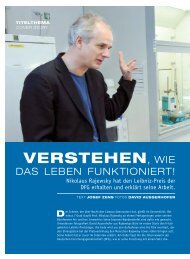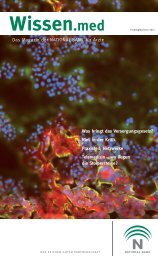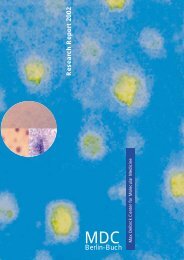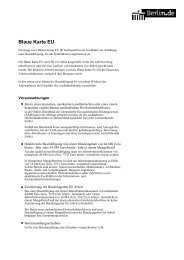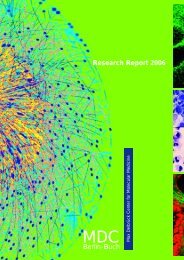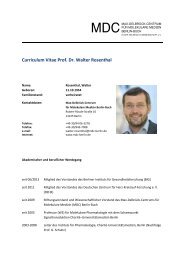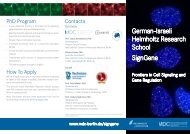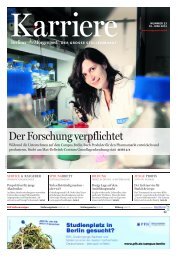Research Report 2010 - MDC
Research Report 2010 - MDC
Research Report 2010 - MDC
You also want an ePaper? Increase the reach of your titles
YUMPU automatically turns print PDFs into web optimized ePapers that Google loves.
International PhD ProgramInternationales PhD-ProgrammThe <strong>MDC</strong> considers the training of new generationsof researchers as a basic prerequisite forsustainable development and international scientificsuccess. In 2003, an International PhD Programin “Molecular Cell Biology” was successfully establishedby the <strong>MDC</strong> and the Humboldt University (HU).Since that time, the <strong>MDC</strong>’s offerings to graduate studentshave significantly expanded through the establishmentof several new programs and rising numbersof applicants.In 2007 the <strong>MDC</strong> and its partners – the HU, the FreieUniversity (FU), and the FMP – were awarded a 6-yeargrant (3,6 Mio ¤) to establish the Helmholtz GraduateSchool in Molecular Cell Biology (HGS-MCB). ThisGraduate School offers a unified interdisciplinary platformfor structured PhD training at the <strong>MDC</strong> and theconsolidation of various graduate activities, such astraining, supervision, measures to assist internationalstudents, quality control, and the creation of an alumninetwork. Training in research skills is further complementedby a structured Soft Skills DevelopmentProgramme, ensuring that PhD students receive awell-rounded education that is essential for successin the modern scientific world. An annual review ofthe progress of all PhD students is carried out by PhDProject Committees that consist of 3 - 4 researchgroup leaders from different research areas. Qualitycontrol and recording of all training activities will becarried out using the system of credits, analogous tothe European Credit Transfer System, and students’achievements are summarized in the <strong>MDC</strong> PhDCertificate.In addition, close collaboration between the <strong>MDC</strong> andthe FU led to the establishment of the Helmholtz<strong>Research</strong> School in Molecular Neurobiology(‘MolNeuro’) in 2007, funded with 1.8 Mio ¤ over 6years. The training curriculum focuses on basic andadvanced concepts of Molecular Neurobiology combinedwith a Soft Skill Development Programme thatis organized by the Helmholtz Association for doctoralstudents from the <strong>MDC</strong> and other Helmholtz<strong>Research</strong> Schools. In addition the students organizean annual student conference called the Berlin BrainDays.Die Ausbildung junger Nachwuchswissenschaftlerist für die zukünftige Entwicklung des <strong>MDC</strong>und seinen internationalen wissenschaftlichenErfolg unverzichtbar. Aus diesem Grund richteten 2003das <strong>MDC</strong> und die Humboldt-Universität zu Berlin (HU)das Internationale PhD-Programm “Molekulare Zellbiologie”ein, das sich in den folgenden Jahren erfolgreichetablieren konnte.Seitdem hat sich das Angebot für die Doktorandendurch den Aufbau neuer Doktorandenprogrammeerweitert: 2007 erhielten das <strong>MDC</strong> zusammen mit seinenPartnern-HU, Freie Universität Berlin (FU) sowie dasLeibnitz Institut für Molekulare Pharmakologie (FMP)die Zusage die Helmholtz Graduate School „MolecularCell Biology“ zu gründen. Sie wird aus dem Impuls- undVernetzungsfonds des Präsidenten der Helmholtz-Gemeinschaft mit insgesamt 3,6 Mio Euro über 6 Jahregefördert und ist die Grundlage für eine interdisziplinäre,strukturierte Ausbildung aller Doktoranden am<strong>MDC</strong>. Das Ausbildungs-Curriculum beinhaltet nebendem gesamten Spektrum der molekularen Zellbiologieauch die Entwicklung zusätzlicher Schlüsselqualifikationen,sogenannter „Soft Skills“. Es stellt sicher, dass dieDoktoranden eine vielseitige und umfassende Ausbildungerhalten, die für den Erfolg in der modernen Wissenschaftsweltentscheidend ist.Die jährliche Leistungsbewertung aller Doktorandenwird von PhD-Projektausschüssen durchgeführt, die sichaus drei bis vier Forschungsgruppenleitern aus verschiedenenForschungsbereichen zusammensetzen. Die Qualitätskontrolleund die Dokumentation aller Ausbildungsmaßnahmenwerden entsprechend dem europäischenLeistungspunktsystem ECTS (European CreditTransfer System) durchgeführt. Nach Abschluss ihrerPromotion erhalten die Absolventen ein <strong>MDC</strong>-Promotionszertifikatmit ihren Leistungen und können in dasAlumni-Netzwerk aufgenommen werden.Die enge Zusammenarbeit zwischen <strong>MDC</strong> und FUführte 2007 zur Gründung der „Helmholtz <strong>Research</strong>School Molecular Neurobiology (HRS „MolNeuro“), diemit 1,8 Millionen Euro für sechs Jahre gefördert wird.Das Programm bietet eine fachspezifische Ausbildungim Bereich der molekularen Neurobiologie, die durchzentrale Helmholtz-Soft Skill Kurse, die mit DoktorandenAcademics 241



